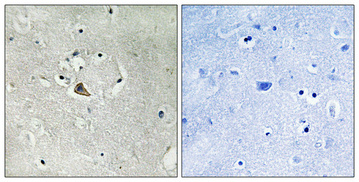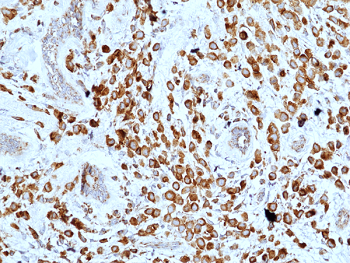Anti-MUC1 [C595]
AB02842-10.0-BT
ApplicationsImmunoFluorescence, Western Blot, ELISA, ImmunoHistoChemistry, RadioImmunoAssay
Product group Antibodies
ReactivityHuman
TargetMUC1
Overview
- SupplierAbsolute Antibody
- Product NameAnti-MUC1 [C595]
- Delivery Days Customer9
- Application Supplier NoteTo compare this antibody to another antibody (NCRC-11) in its ability to bind its antigen, immunocytochemistry was preformed on both breast carcinoma and normal tissue using the mouse version of this antibody. Furthermore, western blotting was preformed on antigens defined by antibody clone NCRC-11 using the mouse version of this antibody (Price et al, 1990; pmid:1692469). To test the ability of this antibody to deliver therapeutic payloads to ovarian cancer cells, an in vivo assay was preformed in mice inoculated with OVCAR3 using the mouse version of this antibody bound to bismuth 213 (Song et al, 2008; pmid:18347423). To determine MUC-1 expression in HNSCC, immunohistochemistry was preformed on tumors from the larynx, the oral cavity and the pharynx using the mouse version of this antibody. Furthermore, western blotting was preformed with the mouse version of this antibody to identificate tumor antigens in circulating immune complexes (Rabassa et al, 2006; pmid:17064405). While assessing this antibody as a possible cancer treatment a toxicity study was preformed on nude mice. It was done using the murine version of this antibody in combination with DTX. The MTD of a single dose appeared to be between 10 and 15 mg/kg. Further, mice inoculated with OVCAR-3 were treated with the murine verion of this antibody. It significantly decreased the amount of ascites present in the mice compared to control. Finally, immunohistochemistry was preformed on cancer tissue from mice treated with this antibody using the murine version of this antibody (Wang et al, 2011; pmid:21931707). To investigate the clinical application of an 111 In-labelled anti-MUC1 mucin monoclonal antibody (mAb) imaging for staging invasive bladder cancer, immunohistochemistry was preformed on bladder cancer in metastases using the mouse version of this antibody. Further, the 111 In-labeled antibody was administred intravenously to bladder cancer patients to determine whether imaging was possible (Hughes et al, 2001; pmid:11121991). To characterize this antibody, radioimunnology was preformed on a MUC1 related synthetic peptide CAPDTRPAPG (C-G) covalently linked to a branched 400-500 amino acid polylysine polymer backbone using the mouse version of this antibody. Futher, an ELISA was preformed on urinary MUC1 using the murine version of this antibody (Spencer et al, 1998; pmid:10217327).
- ApplicationsImmunoFluorescence, Western Blot, ELISA, ImmunoHistoChemistry, RadioImmunoAssay
- CertificationResearch Use Only
- ClonalityMonoclonal
- Clone IDC595
- Gene ID4582
- Target nameMUC1
- Target descriptionmucin 1, cell surface associated
- Target synonymsADMCKD, ADMCKD1, ADTKD2, CA 15-3, CD227, Ca15-3, EMA, H23AG, KL-6, MAM6, MCD, MCKD, MCKD1, MUC-1, MUC-1/SEC, MUC-1/X, MUC1/ZD, PEM, PEMT, PUM, mucin-1, H23 antigen, breast carcinoma-associated antigen DF3, cancer antigen 15-3, carcinoma-associated mucin, episialin, krebs von den Lungen-6, mucin 1, transmembrane, peanut-reactive urinary mucin, polymorphic epithelial mucin, tumor associated epithelial mucin, tumor-associated epithelial membrane antigen
- HostHuman
- IsotypeIgG1
- Protein IDP15941
- Protein NameMucin-1
- Scientific DescriptionThis chimeric human antibody was made using the variable domain sequences of the original Mouse IgG3 format for improved compatibility with existing reagents assays and techniques.
- ReactivityHuman
- Storage Instruction-20°C,2°C to 8°C
- UNSPSC41116161







